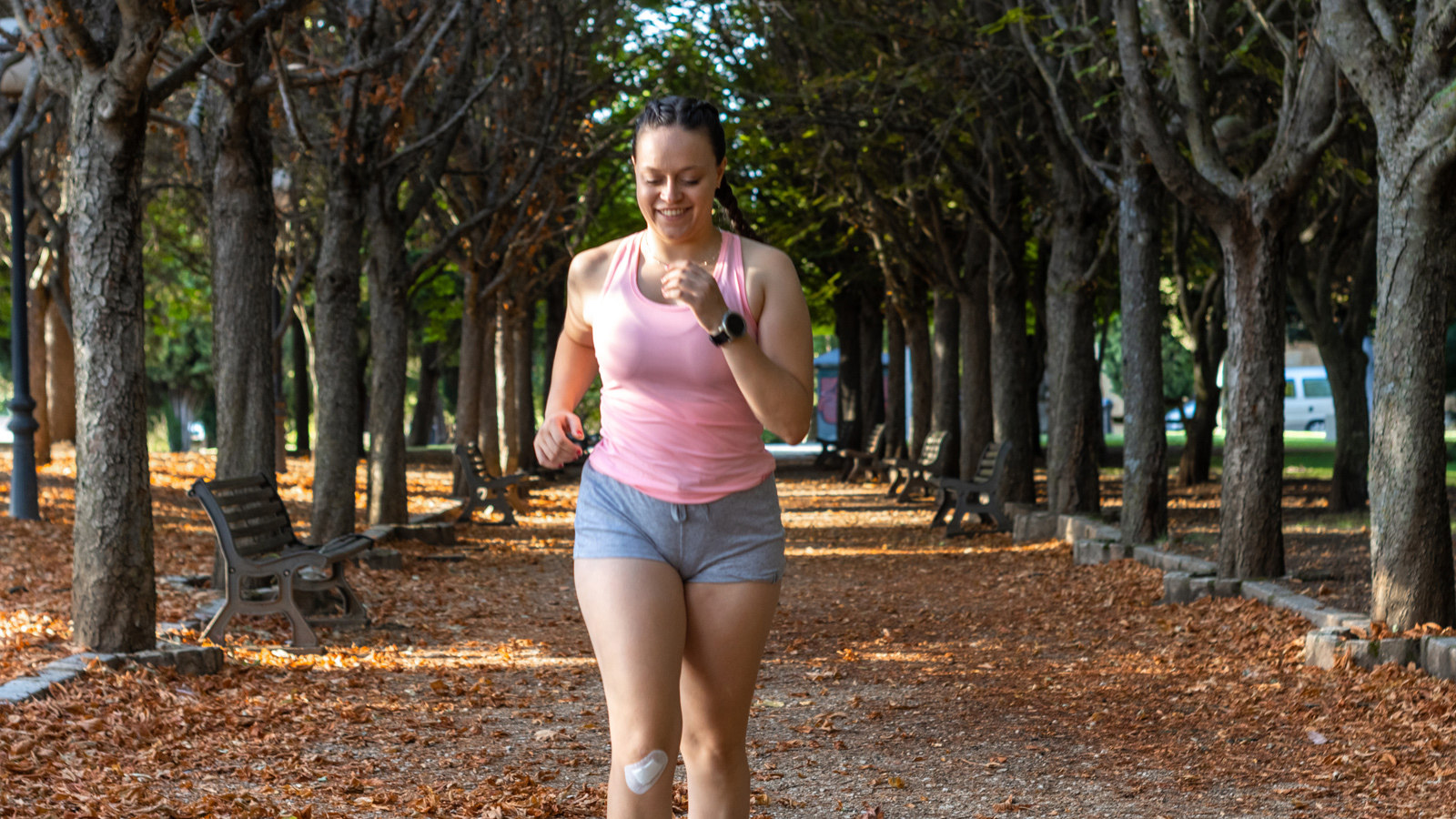Gaining Weight From Running? It’s Not Always A Bad Sign
Running is often touted as a surefire way to shed pounds, but what if you’re actually gaining weight? There are a few reasons you could be gaining weight from running and not all of them are bad – you could just be gaining muscle mass.
Some people start running for weight loss, so it’s a bit of a shock if you start gaining a few pounds. It could be temporary – micro-tears in your muscle fibers causing initial water weight gain or maybe running is making you hungry and you’re eating too much.
This post looks at:
- 9 reasons why you’re running but not losing weight.
- Is it normal to gain weight when you start running?
- How to lose weight running – the healthy way.
Let’s get started!

9 Reasons Why You’re Running But Not Losing Weight
Gaining weight from running can be frustrating, so let’s take a look at the main reasons why you’re not losing weight despite your hard effort.
#1 It’s Temporary – You’re Retaining Water
Running stresses your muscle fibers causing little micro tears. A tiny micro tear can cause muscle soreness and inflammation. Normally this soreness develops 12 to 24 hours after the activity.
Most of the time there will be no underlying problem but as your body repairs these tears, it retains water to help the repair process.
This is why you might see a spike in weight after starting running or after a hard workout – but don’t worry! It’s just temporary weight gain until the excess water is eventually released.
Delayed Onset Muscle Soreness
This delayed onset muscle soreness known as DOMS can peak 1 to 2 days after exercise. If the soreness is mild it’s better to keep moving – just have an easy run or walk.
Making sure you’re fully hydrated will help with recovery.
#2 You’re Eating Too Much Or The Wrong Food
The most common cause of weight gain is overeating. You could be consuming more calories than you are burning through running.
Think twice about your post-run treat. How many calories does it contain?
Just one small brownie contains around 300 calories. If you’ve just been for a 3-mile run, you could wipe out all your hard efforts calorie burning with one small snack.
Avoid Being Hungry With A Nutrient-Rich Diet
Running can make you hungry – very hungry if you’re running long distances. If you’re trying to lose weight and run at the same time, you need to keep a lid on your calorie intake.
The best way to get the balance right is to follow a healthy diet and focus on nutrition. Think about food as fuel. The snack or meal you’re about to eat – what will it do for your body? Will it provide the nutrients you need to be a better runner?
Nutrient-rich food such as lean protein, vegetables, whole grains, fruit, and healthy fats not only provide the protein, carbohydrates, fats, vitamins, and minerals you need to fuel your training – they also fill you up without spiking your blood sugar levels. You’ll stay fuller for longer.

#3 You’re Using Sports Drinks And High-Calorie Sports Nutrition Bars
These are loaded with calories! And most runners don’t need them.
If you run for less than an hour, water is all you need to rehydrate.
Personally, I only use a sports hydration mix if I’m racing or if I’m running for more than an hour and it’s really hot. The rest of the time I just take water with me on my runs.
Experiment – if you cramp a lot find a hydration mix with zero calories.
Pre-Run Snacks
The same goes for pre-run snacks. If you’re only running 2 miles and you’re running for weight loss – it’s okay to run on empty. Many people get up and run fasted first thing in the morning!
If you have a hard training session planned or you’re running further, eat a healthy snack one to two hours before you run. But stick to real food. A banana is better than a sports nutrition bar filled with sugar.
Sports nutrition bars and gels have their place on long training runs and races, but most of the time you won’t need them.
#4 You’re Gaining Muscle
Do you want to lose weight just to hit a number on the scale or is the aim to lose body fat? Increasing your lean muscle mass – strong leg and core muscles – is one of the benefits of running but could be why you’ve gained weight.
Muscle mass is denser than body fat, so it could be causing weight gain. Maybe your clothes are looser but you’re heavier on the scales.
Gained muscle from running is your body transforming into a more efficient running machine. An extra plus is that increased muscle mass will boost your metabolism – your resting metabolic rate (BMR) will increase and you’ll burn more energy at rest throughout the day.
If you’re strength training in the gym and worried about bulking up too much – don’t be. Running will stop your muscles from getting too big. Find out more about your runner’s body.
#5 Your Muscles Are Storing More Glycogen
Start running or increase your running for marathon training or long distances – and your body could respond by storing more glycogen.
Glycogen is the metabolic fuel for your muscles. Each gram of glycogen is stored with at least 3g of water – so if your glycogen stores increase, weight gain is noticeable.
As you get fitter, your body will adjust and use less glycogen. So just be patient – as you adapt to harder training you can expect that weight gain to reduce.
#6 Your Body Is Under Too Much Stress
Running stresses your body. Mainly this is good stress but if you’re constantly over-training or every run is a hard run at tempo pace – you can increase your cortisol levels.
Cortisol is your stress hormone and when it’s too high, weight gain is possible. The most likely cause of raised cortisol levels will be a stressful job or the strain of daily life – but just keep those high-intensity interval sessions to one a week.

#7 You Need To Rest
Gaining weight from running or failing to lose weight can also be a symptom of over-training.
Your body needs rest and recovery. If you’re running every day and pushing yourself to the max, your muscle won’t be recovering. Take time to rest and recover.
#8 You’re Not Eating Enough
Weight loss is linked to creating a calorie deficit but if that deficit is too high, your body is pushed into starvation mode.
When you’re a runner you need to refuel properly. If you’re running for weight loss it’s important to lose weight slowly. Find out how much you should run to lose weight.
Make sure you’re eating sufficient nutrient-dense food to fuel your running with a weight loss target of no more than half to one pound per week, (an average 250 to 500 calorie deficit per day).
#9 You’re Eating Too Much On Your Rest Days
Cut back on the calories on your rest days. If you’re running for weight loss it’s not about depriving yourself of food, but it is important to adjust your calorie intake to match the energy you expend.
Is It Normal To Gain Weight When You Start Running?
Yes, it is normal to gain weight when you start running. Running increases your appetite and changes your metabolism, meaning that you will need more energy to fuel your runs.
Your body will also adjust to the increased activity by storing more glycogen for fuel, retaining water, and increasing muscle mass.
Aside from increased muscle mass, most of the weight gain will be temporary. So persevere!
As long as you are eating a healthy diet and not over-eating, you will soon start seeing the weight loss results you crave.
How To Lose Weight Running – The Healthy Way
Here are a few tips to make your weight loss from running more effective:
Add Strength Training
Adding strength training to your exercise program will make your body more resilient and turn you into a better runner. It also helps with weight loss. Try these bodyweight exercises for runners.
Building muscle increases your metabolism. When you gain muscle mass, you’re increasing your daily calorie expenditure alongside protecting your body from muscle imbalances and injury.
Eat Better
Rather than cutting calories, focus on eating better. Choose nutrient-rich foods and make sure you’re getting enough protein to help repair your muscles after a run.
Get Enough Rest And Sleep
Rest days are essential for recovery, especially when you’re running more miles or pushing harder in training. Take time off and get plenty of sleep – your body needs it!

Thoughts From Love Life Be Fit
Weight loss from running is a journey. You rarely lose weight at a constant rate. If you unexpectedly gain weight from running don’t panic. Have patience, follow these tips, and you will soon start to lose those extra pounds.
It’s consistent training that helps you lose weight. Training that pushes you out of your comfort zone – but not too much.
If you’re new to running, don’t try to train for a marathon in the first few months! One step at a time – train for a 5K or 10K and improve your running times first.






